New Delhi: A man steps out of Gate 1 at Lal Qila metro station, descends the stairs, and strides into Chandni Chowk Lane. He glances left, right, then spits on a patch meant for plants—a square of dirt framed by concrete. This market lane was supposed to be a model of urban renewal, but the benches are stained, garbage bins overflow, and pavements are packed with vendors.
Three years ago, the Delhi government unveiled Chandni Chowk’s brand-new look after its redevelopment project—red sandstone paving, wide walkways, a polished look to lure tourists, and new no-traffic rules. But now, the old mess has crept back, just with newer props.
Large red concrete pots—meant to be filled with lush plants—are used as garbage bins. Concrete benches, meant for tired shoppers, are splotched with paan and gutkha stains. Bikes line up under a signboard saying ‘NMV (No Motor Vehicles) 9am-9pm’. The only indication of the 1.4 km redevelopment from Lal Jain Mandir to Fatehpuri Masjid are signboards about it after every few steps.
The Municipal Corporation of Delhi (MCD) is responsible for sanitation, but an official claimed it took over only three months ago from the Public Works Department (PWD), adding that heavy crowds make the job difficult. A PWD official, however, insists their role was limited to constructing footpaths and pavilions, and that they never had a maintenance contract.
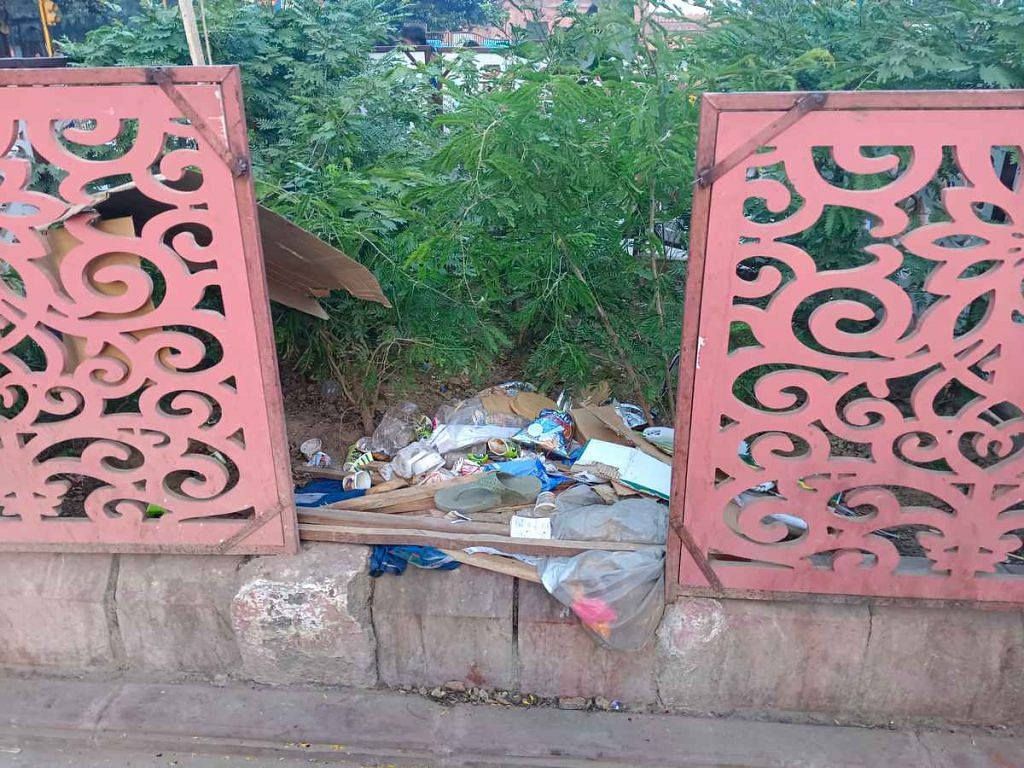
But some argue the problem goes deeper—the redevelopment approach itself was flawed.
“The redevelopment of Chandni Chowk was approached primarily from a tourism perspective, focusing on attracting visitors from outside. However, the authorities failed to adequately facilitate requirements of resident stakeholders or negotiate feasible alternatives with them while implementing new rules and regulations, leading to a breakdown in compliance,” said architect and urban renewal expert Madhav Raman, founding partner of Delhi-based Anagram Architects.
Chandni Chowk’s makeover was part of the Shahjahanabad redevelopment plan. Digital photographs and project plans show a wide pedestrian area, streetside seating, and new washrooms along the stretch. While all of these features do now exist, many are either in disrepair or not in a usable condition.
The blue and green dustbins are overflowing, with an unsightly mess around them. The ‘pedestrian’ area is crowded with street vendors, e-rickshaws, and even banned bikes.
“The area was specifically developed to provide us with space to walk in this congested place, but we still don’t have that even after the redevelopment. Street vendors and e-rickshaws have taken over, despite the prohibitions,” said Suman Sharma, a 40-year-old visitor, searching in vain for a clean spot to sit.
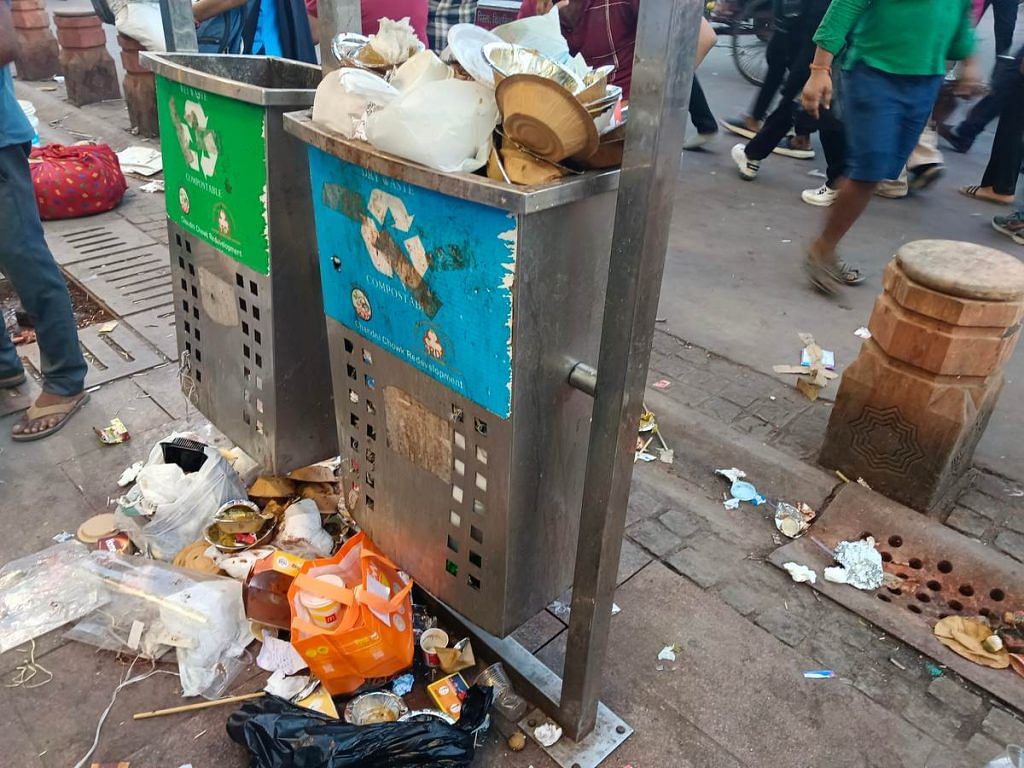
Also Read: No burqa, no men to be wary of—Daryaganj’s Parda Bagh brings women out to laugh, talk, play
Tourist hub, migrants’ home
Chandni Chowk has always been a crush of people and commerce. Shoppers crowd its alleys for everything—bridal lehengas, silver jewellery, exam prep books, ittar. There’s Paranthe Wali Gali and chaat stalls on every corner. But it’s always been a place you had to brave, not linger to enjoy.
The redevelopment was supposed to change that. With its temples, gurdwara, mosque, and endless shops, Chandni Chowk, the commercial heart of Shahjahanabad, was set to become a true tourist hotspot.
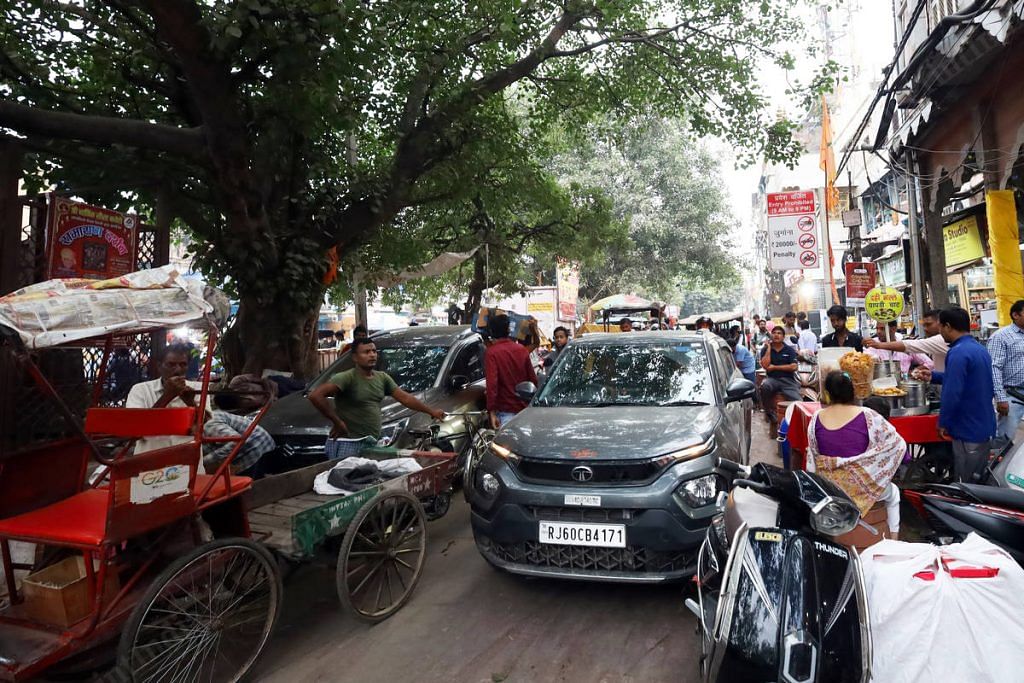
When former Delhi Chief Minister Arvind Kejriwal inaugurated the revamped market in September 2021—a project three years in the making—he extolled its transformation. The plan promised pedestrian-friendly streets, free from motor vehicles between 9 am and 9 am, and a lively food hub after hours.
“It has already become an important tourist place,” he said. “Street food joints will be allowed to open till 12 am so that people can come here in the night and enjoy.”
But not everyone in Chandni Chowk fit into the plan—especially the area’s large migrant population. On multiple visits by ThePrint this month, people were seen sleeping in open spaces—medians, footpaths, parked handcarts, and cycle-rickshaws. Some were even bathing, or washing and drying clothes outside.
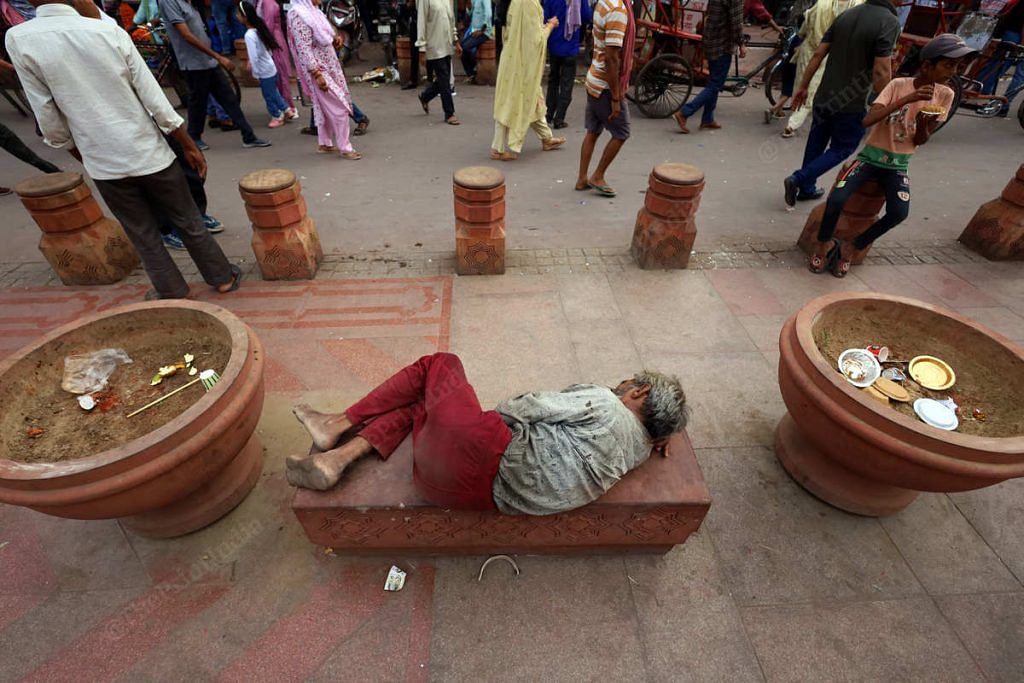
“People who sleep on the streets litter the area and then move to another spot the next day, making it challenging to maintain sanitation at each location,” complained an MCD official on the condition of anonymity.
But that’s far from the only problem. As often happens, new rules have failed to take hold on the ground.
Also Read: Delhi’s Urdu Bazaar is dying. Mughlai sells, not Manto & Mirza Ghalib
Rules, rubbish, relapse
Despite the grand makeover, navigating Chandni Chowk is still a game of dodge and weave. The traffic hasn’t vanished and street vendors selling bags, soft toys, shoes, home products, and food items have taken over the wide new footpaths.
Officially, only 400 rickshaws are allowed in the development lane, and goods loading is restricted until 9 pm. Yet, these rules are largely treated as suggestions. Motorbikes whiz through at all hours, ignoring the Rs 20,000 fine for violating the no-motorised-traffic rule. Goods still flow in on handcarts and rickshaws.
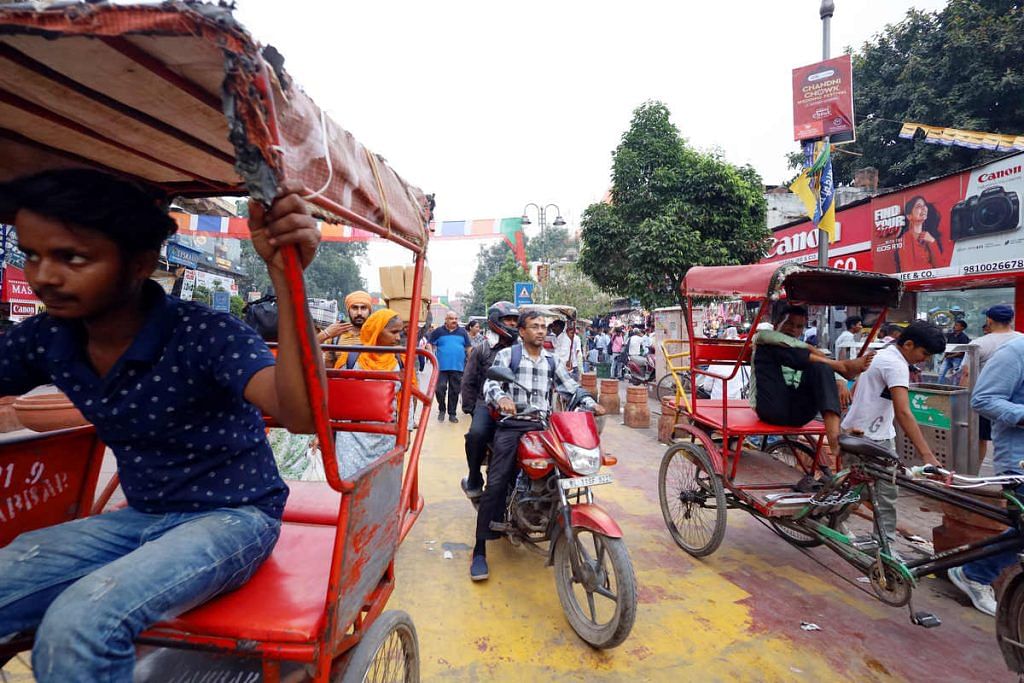
The traffic police patrol daily and monitor footage of violators, but it’s a losing battle.
“Every day, more than 250 to 300 challans are issued for violations of traffic rules in the area. Most rule breakers come from the other side of the stretch or from the inner lanes, which makes it difficult for our team to stop every individual from entering the zone,” said a Delhi traffic inspector, speaking on the condition of anonymity.
Pedestrians also have a long list of woes, from the ever-shrinking walking space to the trash on the streets.
“While the government made sitting arrangements, we can’t sit or get near them because of garbage and spit marks. It’s even very difficult to cross the road because of traffic,” said shopper Mahesh. “Everything feels as congested as it was before.”
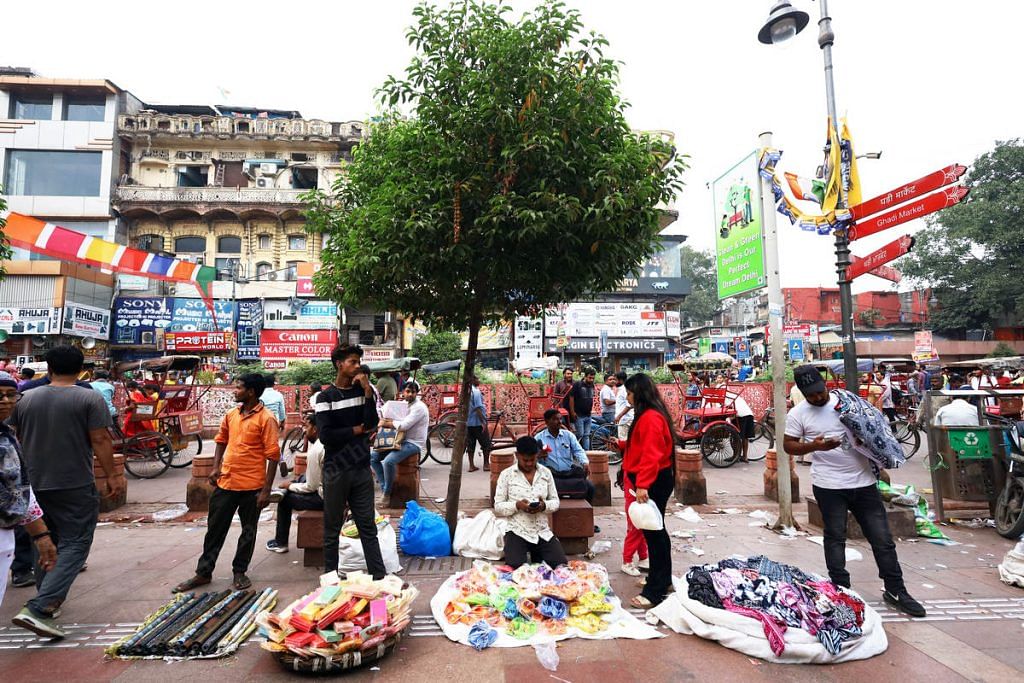
The area is a major street vending zone, accommodating thousands of vendors. It’s estimated in the project documents that the Jama Masjid Precinct, Peripheral Road, and Subhash Marg have around 6,000 to 15,000 vendors on peak days, while Chandni Chowk itself hosts about 250—selling everything from fresh produce to clothing.
Then there’s the litter on the roads.
Outside Old Famous Jalebi Wala, a popular sweet shop, lines of people wait for their turn, enjoying jalebi with rabdi and then tossing their plastic bowls to the ground. Similar scenes play out outside many other shops. Dustbins are present but so full that their contents spill to the streets.
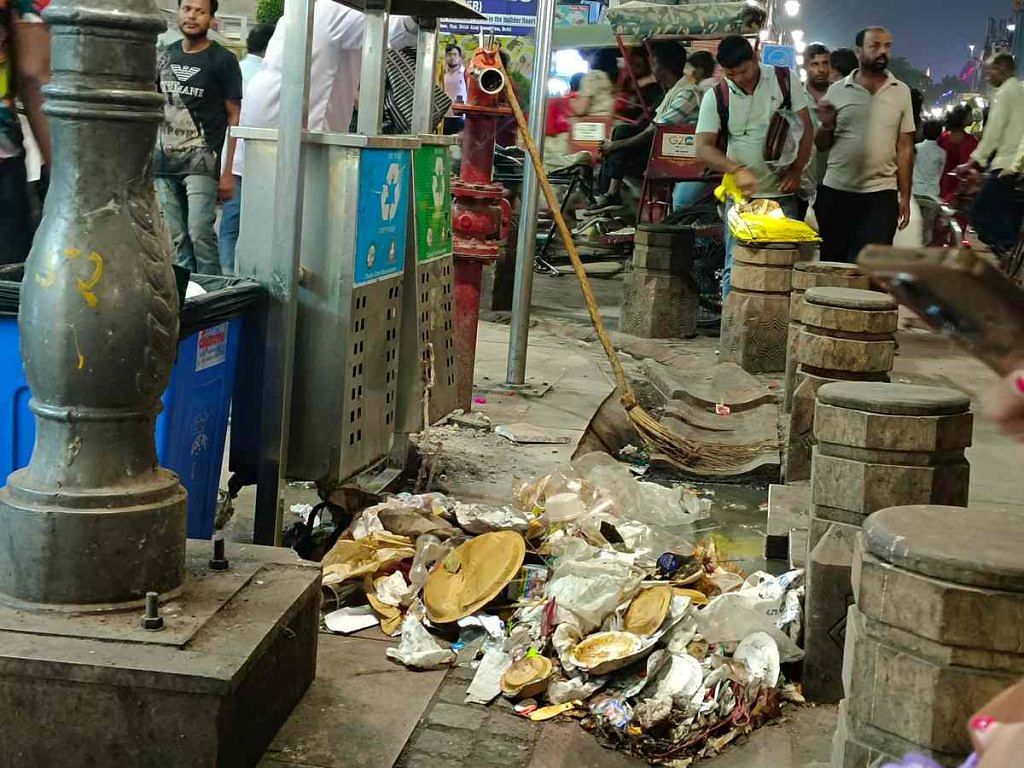
While some shopkeepers blame delays in waste collection for this situation, MCD officials insist they are on top of things.
“Our team is continuously working to maintain sanitation at the site, but people are not following the rules despite the fines imposed,” said an MCD official, requesting anonymity. “Regular cleaning and sweeping are being conducted, but due to the high number of footfalls every day, it has become challenging to maintain cleanliness.”
For urbanist Madhav Raman, the redevelopment is faltering because authorities overlooked the needs of those who actually live and work in the area.
“The failure of the Chandni Chowk redevelopment highlights a significant communication gap between the authorities and local residents regarding rule enforcement,” he said. “It is disheartening to see that the aspirations outlined in the Chandni Chowk redevelopment plan have been compromised.”
People break the rules because they don’t have better options, according to Raman. He gave the example of the 9 PM restriction on loading and unloading goods, which leaves businesses stranded if they have urgent needs. Similarly, the cap on rickshaws in the redeveloped area puts thousands of local drivers’ livelihoods in jeopardy.
“During the project’s execution, it was crucial for the government and relevant authorities to first consider alternatives for the residents and businesses in the area,” he said. “Shahjahanabad is a living heritage, and it is essential for the government, authorities, and community to collaborate to preserve it.”
(Edited by Asavari Singh)



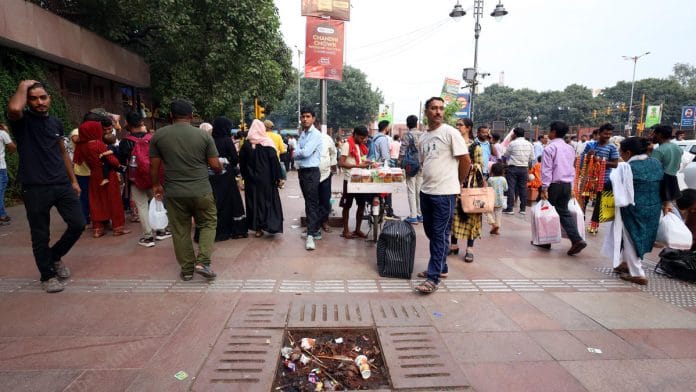



Oh! I thought lord Kejriwala had made Chandni chowk and Delhi better than Singapore.